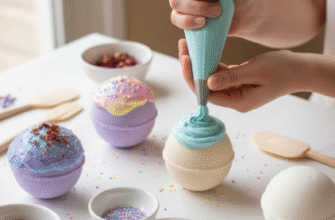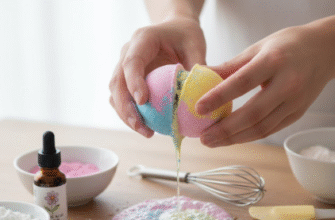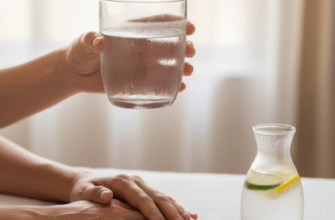Sinking into a warm bath at the end of a long day feels like a universal pleasure. It’s a simple luxury, a moment of peace and quiet. Naturally, we look for ways to enhance this experience. A scroll through social media might show tubs filled with colourful swirls, flower petals, or even exotic ingredients. While the temptation to get creative is strong, not everything belongs in your bath water. Some seemingly harmless additions can lead to skin irritation, plumbing nightmares, or just a plain unpleasant soak. Let’s dive into some things you should definitely think twice about before tossing them into your tub.
From the Kitchen Pantry: Not Always a Good Idea
Your kitchen holds many wonderful, natural ingredients, but their place isn’t always in your bath. Just because something is safe to eat doesn’t mean it’s safe for prolonged contact with your skin or good for your plumbing system.
Strong Acids: Vinegar and Citrus Juices
Vinegar, particularly apple cider vinegar, often gets touted for various home remedies. While diluted vinegar rinses for hair are one thing, pouring significant amounts into your bath is quite another. Undiluted or large quantities of vinegar can be quite harsh on the skin. Its acidic nature can strip natural oils, leading to dryness and irritation, especially for those with sensitive skin or conditions like eczema. It can potentially disrupt the skin’s natural pH balance. Beyond skin concerns, the strong smell might not be relaxing for everyone, and certain types of vinegar could potentially damage the finish on some bathtubs or fixtures over time.
Similarly, squeezing a bunch of lemons or limes, or tossing in citrus slices, might seem like a refreshing idea. However, citrus juices are also acidic. This acidity can cause stinging and irritation, particularly on any small cuts, abrasions, or sensitive areas. Furthermore, citrus oils can increase photosensitivity, meaning your skin might be more prone to sunburn after the bath if you don’t rinse thoroughly. And let’s not forget the practical aspect: pulp and rind pieces can easily slip down the drain and contribute to clogs. Cleaning up floating fruit bits isn’t exactly relaxing either.
Spices That Pack Too Much Heat
Thinking of a warming, spiced bath? Be very careful. Spices like cinnamon, cayenne pepper, cloves, or even ginger powder might sound cozy, but they contain potent compounds that can cause significant skin irritation. These spices create a warming sensation by increasing blood flow to the skin surface, which can quickly escalate into uncomfortable burning, redness, and rashes when submerged in warm water, which opens pores and increases absorption. It’s a recipe for discomfort, not relaxation.
Excessive Baking Soda
Baking soda often appears in bath bomb recipes or as a suggested addition for soothing skin. In small, measured amounts, it might be fine for some people, helping to soften water. However, adding large, unmeasured quantities can significantly alter the water’s pH, making it too alkaline. This alkalinity can disrupt the skin’s natural acid mantle – the protective barrier that keeps moisture in and bacteria out. Over time, or for sensitive individuals, this can lead to excessive dryness, itchiness, and irritation. Moderation is key, and if you have sensitive skin, it’s probably best avoided altogether.
Household and Beauty Products Out of Place
Your bathroom and vanity contain products designed for specific purposes. Using them off-label in your bathwater is generally a bad plan, ranging from ineffective to downright dangerous.
Hair Dye
This might seem obvious, but attempting any part of the hair dyeing process in the bath, or adding leftover dye to “tint” the water, is a terrible idea. Hair dyes contain strong chemicals and pigments designed to penetrate the hair shaft. These chemicals are not meant for prolonged contact with your entire body and can cause severe skin reactions or chemical burns. Plus, hair dye will almost certainly permanently stain your bathtub, grout, and any towels it comes into contact with. It’s a messy, risky endeavour with no upside.
Bleach and Harsh Cleaning Agents
Never, ever add bleach or other strong household cleaners (like ammonia-based products, drain cleaners, or abrasive powders) to your bath water. This is incredibly dangerous. These products can cause severe chemical burns on contact with skin. More alarmingly, mixing them with warm water in an enclosed space like a bathroom creates toxic fumes that can cause serious respiratory distress, lung damage, or worse. Always keep cleaning products separate from bathing activities and ensure good ventilation when cleaning the tub itself.
Important Safety Warning: Never add household bleach or strong cleaning chemicals to bath water. The risk of severe skin burns and the inhalation of toxic fumes in a confined space is extremely high. These products are not designed for skin contact and can cause serious health emergencies. Always store cleaning products safely away from bath time.
Perfumes and Alcohol-Based Body Sprays
Wanting a fragrant bath is understandable, but dumping your favourite perfume or body spray into the water isn’t the best way to achieve it. Most perfumes and body sprays have a high alcohol content. Alcohol is very drying to the skin, counteracting the hydrating effect of the bath. Furthermore, the concentrated fragrances, not designed to be diluted in water and soaked in, can cause skin irritation or allergic reactions for some individuals. Stick to bath-specific fragrance options like essential oils (properly diluted!) or scented bath bombs/salts.
Craft Glitter (The Non-Biodegradable Kind)
A bath filled with shimmering glitter looks magical in photos, but the reality is often less enchanting. Standard craft glitter is essentially tiny bits of plastic. These particles don’t dissolve. They stick to you, they stick to the tub, and they wash down the drain. This contributes to microplastic pollution in waterways, harming aquatic life. They can also clog your drain over time. While some bath products contain biodegradable glitter, avoid simply tossing regular craft glitter into your soak. It can also potentially cause micro-abrasions on the skin or get into sensitive areas, causing irritation.
“Natural” Doesn’t Always Mean “Bath-Safe”
Even items from nature need careful consideration before they join you for a soak. Their natural state isn’t always compatible with drains or sensitive skin.
Whole Flowers and Loose Botanicals
Floating rose petals or lavender buds might seem like the height of luxury bathing. While visually appealing initially, loose plant matter poses a significant plumbing risk. Petals, leaves, stems, and buds can easily clump together and create stubborn drain clogs. They also require considerable cleanup, sticking to the sides of the tub and to your skin. If you want the benefits or aesthetics of botanicals, enclose them securely in a muslin bag or a large tea infuser before placing them in the bath. This allows the beneficial compounds and scent to infuse the water without the plumbing headache.
Undiluted Essential Oils
Essential oils are incredibly popular for adding fragrance and potential therapeutic benefits to baths. However, they are highly concentrated plant extracts and must be used correctly. Oil and water don’t mix. Pouring essential oils directly into bath water means the undiluted oil droplets will float on the surface and come into direct contact with your skin. This can lead to irritation, sensitization (developing an allergy over time), or even chemical burns, especially with “hot” oils like cinnamon, clove, oregano, or peppermint. Always dilute essential oils in a carrier substance like a fatty oil (coconut, jojoba, almond), unscented liquid soap, or Epsom salts before adding them to the water. This helps disperse the oil more safely.
Verified Safe Practice: Essential oils should always be diluted in a suitable carrier before adding to bath water. Good options include mixing a few drops into a tablespoon of carrier oil (like jojoba or fractionated coconut oil) or a handful of Epsom salts. This prevents undiluted oils from directly contacting the skin, reducing the risk of irritation or burns.
Bath Bombs with Hidden Surprises
Most bath bombs are designed to dissolve completely, releasing colours, scents, and skin-softening ingredients. However, some novelty bath bombs contain non-dissolving elements like small plastic toys, non-biodegradable glitter, or large insoluble chunks. While perhaps fun initially, these items can pose a choking hazard for young children if left unattended. They also contribute to plastic waste and can potentially block drains if small enough to slip through the grate but too large to pass through the pipes easily. Check the ingredients and design of bath bombs, especially novelty ones, before use.
Why Avoiding These Additives Matters
The reasons to skip these additions boil down to a few key concerns:
- Skin Health: Many of these items can irritate, dry out, burn, or cause allergic reactions, turning a relaxing bath into an itchy, uncomfortable ordeal.
- Plumbing Problems: Clogged drains are inconvenient and can be expensive to fix. Ingredients like glitter, undissolved solids, excessive oils, and plant matter are common culprits.
- Tub Damage: Harsh chemicals, dyes, and even some acids can stain or etch the surface of your bathtub, requiring repairs or replacement.
- Safety Risks: Toxic fumes from cleaners or chemical burns from undiluted substances pose genuine health hazards.
- Environmental Impact: Non-biodegradable glitter and certain chemicals washed down the drain contribute to water pollution.
A bath should be a sanctuary, a place to de-stress and care for yourself. By being mindful of what you add to the water, you ensure the experience remains safe, pleasant, and truly relaxing. When in doubt, stick to products specifically formulated for bathing, follow usage instructions carefully, and always prioritize your skin’s health and your home’s plumbing. A little caution ensures your bath time remains a blissful escape, not a source of regret.








